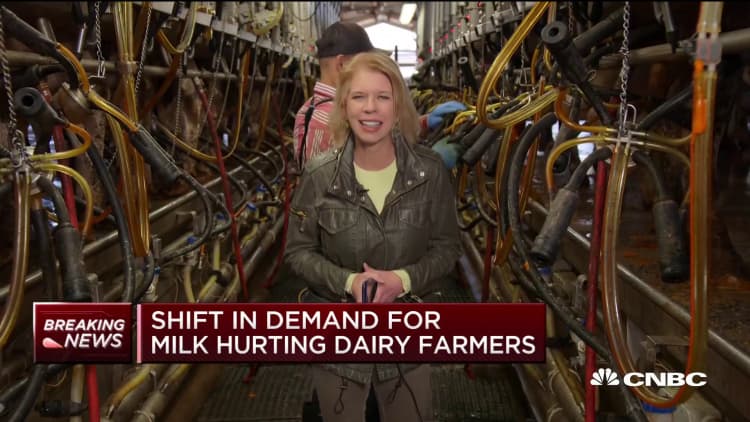Farmers all over the world are letting their crops rot in the fields as the coronavirus pandemic disrupts supply and demand for a wide variety of perishable goods including flowers, fruit and milk.
Some have resorted to creative ways to get rid of supplies they are stuck with, such as feeding strawberries to cows.
The United Nations Food and Agriculture Organization flagged the risks of a food crisis due to the pandemic earlier this year. It is now playing out globally due to widespread lockdowns and movement restrictions to contain the spread of Covid-19.
"The lockdowns that we are all experiencing across the globe are causing a disruption of labor, so we are not getting people into the fields to produce on farms. Also it's a disruption of worldwide transport and supply chains that is causing this unusual phenomenon of shortages in some areas and excess in others," said Michael Strano, a lead principal investigator for disruptive and sustainable technology in agriculture at the Singapore-MIT Alliance for Research and Technology.
Even though production levels have generally been healthy, harvests have been affected due to the lockdowns as many workers can't get to the farms to work or are unable to transport the produce.
Adjusting to new norms
"There are no real threats as much as supply chain adjustments, and certainly no shortage of food," said Gary Weber, senior director for food safety and contamination prevention at WorldAware, a risk management company.
"Reports of empty shelves are due to hoarding, shifts in eating patterns from restaurants to the home, students being at home during the day and eating lunches previously consumed at schools, and some supply chain adjustments that are underway," Weber told CNBC in an email.
It comes as food banks in the U.S. report shortages of staple food, even as the coronavirus-hit economy triggers a spike in the number of people needing help.
With more people cooking at home, supply chains need to shift from catering to restaurants to catering to grocery stores. But they have different requirements in terms of packaging and specific cuts, in the case of meat. This also means that sellers need to have the equipment in place to package the food for consumers — and many don't.
In the case of milk, dairy farmers in the U.S. have been forced to dump them due to a reduction in demand. "School lunch programs purchase a lot of milk, cheese, butter, and other products," noted Weber.

Using any excess milk to make cheese and other dairy products will also require adjustments to the process and storage space.
"The supply chain is adjusting to the new normal. Specifically, there is a supply chain that caters to schools, restaurants, cafeterias, etc. and another that caters to grocery stores," said Hitendra Chaturvedi, a supply chain expert and professor at Arizona State University.
U.S. spending on food away-from-home accounted for 54.4% of total food expenditures in 2018, according to the U.S. Department of Agriculture.
"With COVID-19 closing schools and cafeterias, that supply chain is transitioning to start producing products to suit a grocery store. And that takes time," Chaturvedi added to CNBC in an email.
Fruit and flowers tossed
It's not just food that's being discarded, perishable items like flowers are also being thrown away as demand dries up globally.
In the Netherlands, growers have been forced to compost flowers due to a plunge in demand for the blooms as many events have been canceled. Netherlands accounts for about 80% of the world's flower bulb production.
If producers knew that schools and offices will not re-open across the board, they would re-jig their entire supply chain and send them to grocery stores, and all the shortages would be over. But they do not know the answer yet.Hitendra ChaturvediArizona State University
According to trade cooperative Royal FloraHolland, which runs the world's largest floral auctions, prices were 22% lower than a year ago at last week's flower and plant auctions.
Fruit growers in various parts of the world, from the U.S. to Southeast Asia, also have supplies they are unable to move due to movement restrictions keeping workers and customers away.
Some places are trying to shore up local demand to consume the products that would otherwise be left to waste.
Belgians are being called upon to eat fries at least twice a week as more than 750,000 tons of potatoes are at risk of being thrown away.
In India, some farmers are feeding strawberries — normally meant for tourist consumption and ice-cream producers — to cows, Reuters reported.
In the Netherlands, companies have stepped up to buy blooms so as to give them away to employees or others.
Although suppliers know they need to readjust their business and supply chains, the uncertainty has made it hard to make business plans.
"If producers knew that schools and offices will not re-open across the board, they would re-jig their entire supply chain and send them to grocery stores, and all the shortages would be over," said Chaturvedi. "But they do not know the answer yet."

